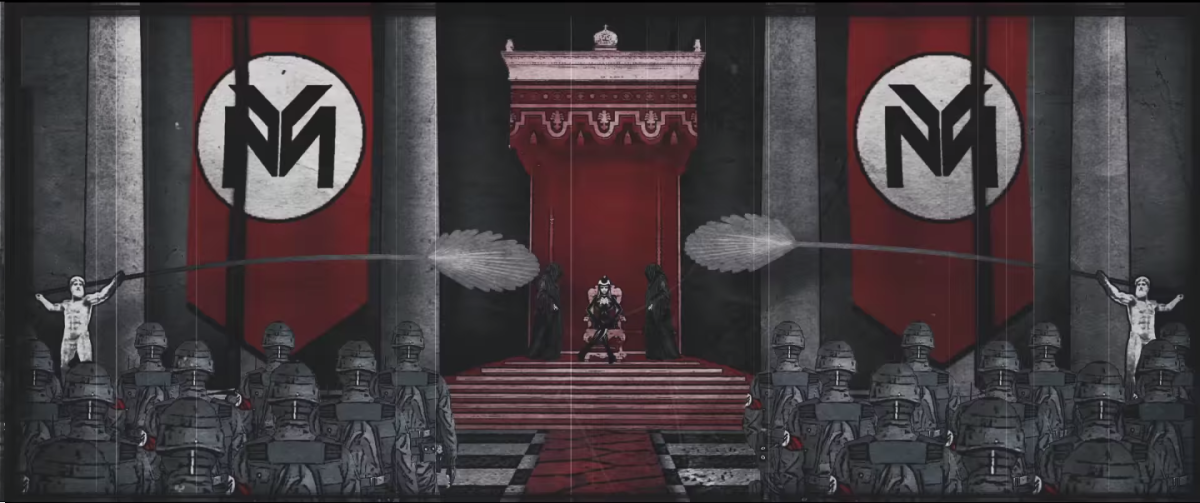What motivates you to watch a new show or listen to a new song?
That’s the question on every producer’s mind as they carefully make plans to promote new music, movies, television shows, products and services.
With the growing variety of options a consumer can choose from, artists are relying on controversy to promote themselves and their music — sometimes pushing it too far.
Rapper Nicki Minaj made headlines over the weekend after releasing the lyric video for her latest single “Only,” which featuring Drake, Lil Wayne and Chris Brown.
The video features a series of images — Minaj sitting on a throne while facing an army of soldiers wearing red armbands. Red-and-white flags featuring a redesigned Young Money Records logo are reminiscent of those of the Nazi regime waving in the background. Fans and critics have recognized these shots as offensive and anti-Semitic.
While this isn’t the first time a performer has incorporated a controversial topic into their music and stage presence, Minaj takes it to an inappropriate level that crosses the boundary of what is acceptable.
The reasoning behind displaying these types of messages is to create buzz around the content by shocking the audience. Artists have exaggerated or sexualized religious themes in their material in the past, like Lady Gaga’s infamous video for her single “Judas.”
But in Minaj’s case, the shock to the system left a bitter aftertaste.
“Nicki Minaj’s new video disturbingly evokes Third Reich propaganda and constitutes a new low for pop culture’s exploitation of Nazi symbolism,” said Abraham H. Foxman, a Holocaust survivor and national director of the Anti-Defamation League, in a statement he made to the press.
In an interview with the United Kingdom’s The Independent, Minaj said that she aims to inspire female empowerment with her upcoming album “The Pinkprint.” This theme is apparent in both the lyric video for “Only” and the music video for “Anaconda.”
But the “Only” video could’ve conveyed Minaj’s point without referencing Nazis.
Take away the red armbands from the soldiers. Slightly alter the flag’s design. Keep Minaj in the throne and Drake in the role of a religious leader, and the video would’ve sent the same message to viewers, minus the controversy.
But often, controversial buzz actually benefits the artist because it keeps their material relevant.
By going on Twitter to publicly discuss the subject, we as consumers are giving the song and video free advertising. Even reading this column will motivate some to search for the video and comment on it.
We are turning an otherwise bland record into a buzzed and controversial song everyone wants to listen to and comment on, which is exactly what Minaj and the video’s director Jeff Osborne were hoping to accomplish.
Osborne has retweeted many Twitter users’ negative comments, reinforcing the idea that any publicity is good publicity in showbiz.
But in this case, referencing an overly sensitive subject — Nazi Germany — in a somewhat positive light is in bad taste.
In a surprise twist, Minaj acknowledged the public and apologized for the video, explaining the inspiration — a Cartoon Network series called “Metalocalypse” and the film/comic series “Sin City” — as well as the error behind the concept.
“I didn’t come up w/the concept, but I’m very sorry & take full responsibility if it has offended anyone. I’d never condone Nazism in my art,” Minaj tweeted on Tuesday.
The apology not only served to separate Minaj from the insensitive symbolism, but it also reinforces the idea that, while musicians are known for addressing controversial topics, artists like Minaj sometimes acknowledge crossing ethical lines when they believe it’s necessary.
But had she not issued an apology, the negative commentary wouldn’t have affected Minaj’s career or reputation in any major way.
As the Internet and technology continue to evolve, content creators will push ethical boundaries to ensure they remain relevant and newsworthy, no matter who they offend.
The public is scandalized by Minaj’s latest video, but I’m already preparing myself for what might come next.
Jose Bastidas is a 21-year-old mass communication senior from Caracas, Venezuela. You can reach him on Twitter @jabastidas.
Opinion: Nicki Minaj crossed line with Nazi-esque “Only” video
November 11, 2014
This screenshot from Nicki Minaj’s lyric video for “Only” featuring Chris Brown, Drake and Lil Wayne, showcases the video’s imagery that recalls Nazi symbolism.
More to Discover








